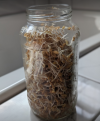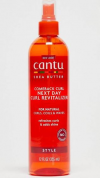Chicoro
9 Year Shea Anniversary: Started Dec 16th, 2016!
Ooo, I love them old school videos.I watched this YT short the other day and I've been second guessing eating them. One of the commenters talked about how it messed up her period.
There was a lady I used to watch YEARS ago who spoke about sprouted fenugreek and had a couple of cautions as well. She took them too, but I believe identified some things to consider before doing so. I can't remember what she said.I'll see if I can find her videos.







 You should join us!
You should join us!



 I also think I'm just gonna do the Fenugreek 2-3 days a week and the other days might be a tea of some other herbs I have on hand. I'll probably be going back to cornrows soon so that'll make things even easier.
I also think I'm just gonna do the Fenugreek 2-3 days a week and the other days might be a tea of some other herbs I have on hand. I'll probably be going back to cornrows soon so that'll make things even easier.

